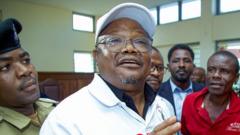The upcoming German elections serve as a critical juncture for the nation's political landscape, potential governance changes, and wider European dynamics.
Germans Head to Polls in High-Stakes Snap Election Amid Global Tensions

Germans Head to Polls in High-Stakes Snap Election Amid Global Tensions
As the new Trump administration reshapes transatlantic relations, Germany's snap election becomes pivotal in determining Europe's future stance.
In a highly anticipated snap election, Germans are preparing to vote amidst mounting pressures from the renewed Trump administration, which has adopted a confrontational stance towards Europe, including tariff threats and exclusion from vital negotiations concerning Ukraine. The election comes as Chancellor Olaf Scholz's three-party coalition government, characterized by unpopularity, fell apart in November, pushing votes forward seven months early, during a crucial moment of uncertainty and reevaluation in Europe’s leadership landscape.
Campaign efforts have struggled to energize voters during this challenging winter climate, with polls indicating a significant lead for Friedrich Merz of the conservative Christian Democratic Union (CDU). The far-right Alternative for Germany (AfD), reflecting public discontent with traditional parties and growing migration concerns, is poised for its strongest performance yet. Meanwhile, the Social Democrats, historically the oldest political party in Germany, are expected to finish in third place, potentially facing their worst electoral outcome since their ban during the Nazi regime.
As the election approaches, analysts point out key elements to watch:
1. **Coalition Dynamics**: The expected performance of the CDU and AfD could lead to complex coalition formations necessary for governance, which may reflect the changing ideological landscape within Germany.
2. **Public Sentiment**: Voter dissatisfaction and apprehensions about migration are major focus areas that could influence the final vote tallies.
3. **Future of European Relations**: The results will likely impact how Germany navigates a partnership with an increasingly assertive Trump administration, as well as how Europe collectively responds to rising authoritarianism.
With tensions high and the political environment fluid, the outcome will not only reshape Germany’s domestic policies but also its international relations and role on the European stage in the future.
Campaign efforts have struggled to energize voters during this challenging winter climate, with polls indicating a significant lead for Friedrich Merz of the conservative Christian Democratic Union (CDU). The far-right Alternative for Germany (AfD), reflecting public discontent with traditional parties and growing migration concerns, is poised for its strongest performance yet. Meanwhile, the Social Democrats, historically the oldest political party in Germany, are expected to finish in third place, potentially facing their worst electoral outcome since their ban during the Nazi regime.
As the election approaches, analysts point out key elements to watch:
1. **Coalition Dynamics**: The expected performance of the CDU and AfD could lead to complex coalition formations necessary for governance, which may reflect the changing ideological landscape within Germany.
2. **Public Sentiment**: Voter dissatisfaction and apprehensions about migration are major focus areas that could influence the final vote tallies.
3. **Future of European Relations**: The results will likely impact how Germany navigates a partnership with an increasingly assertive Trump administration, as well as how Europe collectively responds to rising authoritarianism.
With tensions high and the political environment fluid, the outcome will not only reshape Germany’s domestic policies but also its international relations and role on the European stage in the future.





















